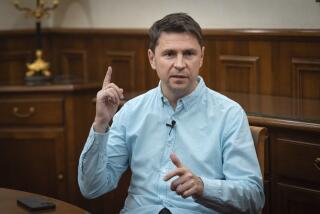Yeltsin and Parliament Still in Flux Over Crisis
- Share via
MOSCOW — Russian President Boris N. Yeltsin was asked Sunday by his acting prime minister and parliamentary negotiators to sign a landmark agreement that would strip him of some of his key powers, including the authority to name most Cabinet ministers.
The power-sharing pact, designed to produce quick confirmation in parliament of acting Prime Minister Viktor S. Chernomyrdin, could give the Communist opposition a role in the Cabinet and a stronger say in the policies Russia will pursue to end its economic crisis.
But it remained unclear whether the president--beset by Russia’s crumbling economy and the collapse of its currency, the ruble--would agree to any erosion of his authority. Even his representative in the talks could not predict what he would do.
“It is too early to speak about the final fate of the draft political agreement,” said Kremlin negotiator Alexander Kotenkov. “If anybody thinks it will be an easy decision for the president, they are laboring in the wrong.”
Complicating the situation further, Communist Party leader Gennady A. Zyuganov backed away from the bargain Sunday night, hours after it was submitted to Yeltsin. Zyuganov announced that he would order his followers, who are the dominant force in the lower house, to vote against Chernomyrdin’s confirmation today despite the deal. “This document guarantees nothing to anyone,” he protested.
With Russia entering the third week of a severe economic crisis, the country’s leadership has been spending most of its energy trying to divide up the powers of a seemingly weakened president.
Despite official assurances that Russians will not lose the savings in their bank accounts and that foreign investors will eventually get back money they lent the government, no one in power has come forward with a plan for solving the country’s fiscal problems.
“At a moment when the country is balancing on the edge of the abyss, the legislators are trying to get their little revenge on the president,” said former Yeltsin advisor Victor Borisyuk. “Instead of trying to help tackle the crisis, the legislators are pursuing their own selfish political interests.”
The extent of the Russian government’s paralysis will be dramatized for the world when President Clinton arrives in Moscow on Tuesday for a long-awaited summit with Yeltsin.
The White House had originally hoped to address such issues as nuclear disarmament and the ongoing conflict in the Serbian province of Kosovo, but Russia’s economic problems are now expected to dominate the summit. Uncertainty over who will run Russia’s government has made a mess of the meeting schedule, and some U.S. officials accompanying the president are not even sure who their Russian counterparts at the summit will be.
“At this point, we don’t have a Russian economic team. We don’t have a Russian economic plan,” U.S. Deputy Treasury Secretary Lawrence Summers told reporters in Washington.
Chernomyrdin, who served more than five years as Yeltsin’s prime minister before the president fired him in March, had sought to push through the power-sharing agreement, win rapid confirmation from parliament and be sworn in before Clinton’s arrival.
But whether he can pull together a deal that would unite the government behind his leadership remains to be seen. He was scheduled to meet with Yeltsin today--the same day parliament is required under the constitution to vote on his confirmation.
“The ruble is hanging by a thin thread,” Chernomyrdin said in a TV interview. “For this reason, decisions must be made no matter by whom, the government, the Duma [the lower house of parliament] or the president. . . . But time must not be lost. The country cannot function without a government.”
Under the constitution written by Yeltsin and forced on parliament in 1993, the president’s powers are far greater than those of legislators. The president can easily dissolve parliament, but it is nearly impossible for lawmakers to force out the president. In addition, the parliament has the right to confirm only the prime minister, not any of the 30 Cabinet ministers.
The power-sharing pact negotiated Sunday would impose an 18-month truce in the constant war between Yeltsin and the Communist-dominated Duma. During that time, parliament could not impeach Yeltsin or try to force out the Cabinet, and the president could not dissolve parliament.
*
The agreement would also give the prime minister--not Yeltsin--the power to select most of the Cabinet ministers, and it would give parliament the right to confirm them. Yeltsin would keep the power to appoint only the prime minister and the ministers of defense, security and foreign affairs.
After Communist Party representatives participated in days of meetings to negotiate the agreement, party leader Zyuganov withheld his support on the grounds that the proposal should be incorporated into the constitution.
Early today, the Communist leadership issued harsh new conditions for agreeing to the confirmation of Chernomyrdin. Yeltsin must resign after a new government is formed, said party official Viktor Ilyukhin, and the new Cabinet must include 10 ministers from opposition parties, including the powerful interior minister, who is responsible for the nation’s police agencies.
In an interview Friday on state-run television, Yeltsin said he would not resign but also pledged not to dissolve parliament. In a second part of the interview, broadcast Sunday evening, Yeltsin said he is opposed to trying to change the constitution now but would favor the formation of a commission to consider amendments.
Changing the constitution “will take a lot of time, at least a year,” he said.
With the start of the business week today, pressure on the government to repair the economy is certain to grow as firms, stores and consumers cope with the uncertainty of the ruble’s value in relation to the dollar.
Russians are heavily dependent on the dollar. It is the country’s second currency.
More to Read
Sign up for Essential California
The most important California stories and recommendations in your inbox every morning.
You may occasionally receive promotional content from the Los Angeles Times.










